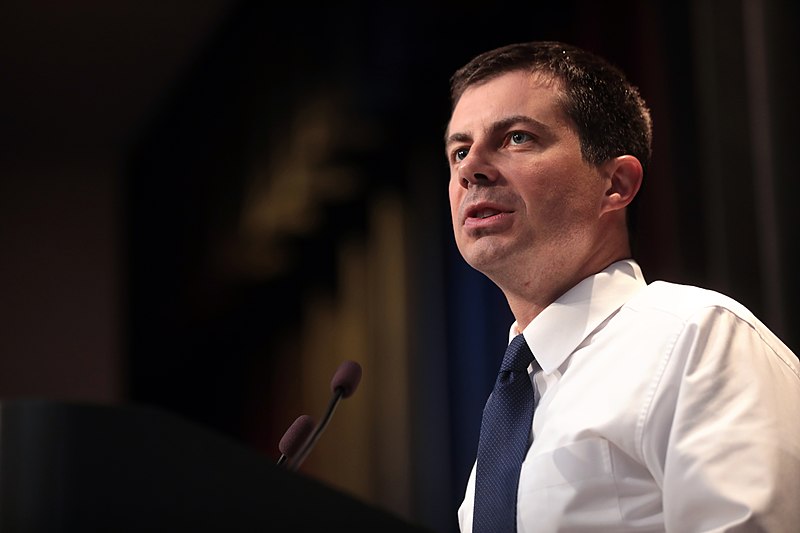Have a story idea
Have a story idea? Send it to us here.

Source : Wikimedia Commons
January 22, 2021
Author : Patty Rodriguez
President Joe Biden’s nominee to head up the Department of Transportation (DOT), Pete Buttigieg, is expected to pass through the Senate confirmation process as soon as next week. In his two-hour confirmation hearing today, Buttigieg signalled big ideas, requiring big investments.
While even the Associated Press admits Buttigieg was “often sidestepping specifics,” some of his comments are worth rehashing. Nonetheless, Buttigieg will be responsible for administering huge sums of cash should President Biden secure the funds he’s looking for, which include $2 trillion for infrastructure, with $50 billion earmarked for road and bridge repairs.
For example, Buttigieg floated adding half a million charging stations for electric vehicles around the country in a bid to encourage the use of electric vehicles. He also discussed the idea of revamping the way highways are funded in the US by taxing drivers on how many miles they’ve driven instead of through the Highway Trust Fund, which is funded through fuel taxes.
He also spoke about the advancements of unmanned vehicle technology and how “policy has not kept up.”
“Automated vehicle tech is coming, it's advancing quickly and it's something that holds the potential to be transformative,” he said. He promised to make sure that “that we’re acting so that on the policy side, we are ready for all of the things that automated vehicles will bring to our roads and to our economy.”
Speaking more broadly on transportation systems, Buttigieg said it’s important to ensure all of them, “from aviation to public transit, to our railways, roads, ports, waterways and pipelines — are managed safely during this critical period, as we work to defeat the virus.”
New Kid on the Block
Buttigieg’s lack of experience in transportation is something which has come under some scrutiny. For example, during his Mayorship of South Bend, Indiana, Buttigieg oversaw the South Bend International Airport, which was the third ranking airport in Indiana in terms of passenger enplanements. Indiana, it should be noted, is considered part of “fly-over country.”
Meanwhile, South Bend’s municipal bus system has a fleet of just 60 vehicles with just 20 routes, according to its website. It seems as though a good portion of the former mayor and military intelligence officer’s experience in transportation was serving as an “Uber” driver for his fellow service members in Afghanistan.
Recently, Buttigieg has been making the rounds on late night shows and cable news programs. In an interview with CNN’s Jake Tapper, Buttigieg was asked about his “lack of experience” — once a point of criticism raised by his now-boss Joe Biden. Tapper noted that South Bend’s government has just around 1,000 employees, whereas the DOT has 60,000.
Buttigieg more or less skirted the question, saying “the American people are ready for us to finally, actually do something with infrastructure. We can’t keep letting infrastructure week be a Washington punchline.”
While Buttiegieg may be lacking in experience, No. 2 at the DOT has plenty to boot.
Biden’s pick for Deputy Transportation Secretary Polly Trottenberg was once Transportation Commissioner in New York City, resigning from the position to take a role to work on Biden’s transition. She also served as “an assistant secretary for transportation policy and under secretary for policy in the Obama administration” and as a transportation policy adviser for Senate Majority Leader Chuck Schumer.
In New York, she worked on implementing Vision Zero in 2014, which aimed to cut down the number of deaths caused by collisions in the city. Last year, the city announced that the program had reduced pedestrian-traffic fatalities by 36 percent at priority locations.
The shake-up at DOT comes at a pivotal time for the US in terms of transportation. Due to the impact of the coronavirus pandemic, public transportation such as busses and subway systems — as well as highways and airports — are facing critical revenue declines. Is Biden’s team up to the task? Let us know what you think in comments on Facebook and Twitter.
Photo via Wikimedia Commons.
Category : Contractor Trades Coronavirus Pandemic Department of Transportation Federal Government Green Construction Investment in Infrastructure
